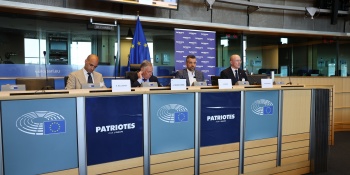Published: 31.05.2019

The upcoming elections to the European Parliament are an opportunity to summarize the most important activities of MEPs over the last term. The Ordo Iuris Institute has prepared a summary list showing the results of votes on the protection of life from conception, the identity of marriage, or the right of parents to raise children in accordance with their own beliefs. The analysis shows that over the last five years the European Parliament’s active support for the postulates of the LGBT movement and pro-abortion organisations has actually grown.
Over its 8th term, the EP often spoke about the admissibility of killing unborn children in the Member States, presenting an increasingly stronger support for pro-abortion postulates. In its subsequent resolutions, the Parliament not only promoted the legalisation of prenatal murder, but also, in the first place, started to advocate the “right to abortion” construct as, allegedly, one of human rights.
The key moment was the adoption of two controversial resolutions in March 2015. They stated, inter alia, that women should have had “ready access to contraception and abortion”. In February 2017, MEPs decided that reproductive rights included the possibility of killing an unborn child. In March of the same year, the European Parliament criticised “the excessive use” of conscientious objection clauses in some countries. It happened despite the fact that it is a key human right to act in accordance with one’s own conscience, and be free from coercion to act against it.
Then, in November 2017, MEPs explicitly spoke for a possibility of prenatal murder in cases of serious illnesses. This resolution is an example of discrimination on the basis of disability. Further, in February 2019, the Parliament expressed the view that pro-life and pro-family organisations were, allegedly, opposing human rights.
On a number of occasions over the last parliamentary term, the European Parliament also took a position with regard to the postulates of the LGBT movement. In one of its reports from 2015, MEPs postulated that “family and work legislation [should] be made more comprehensive with regard to single-parent families and LGBT parenting”, which is associated with increasing pressure to take away the legal protection from marriage as a union of man and a woman in favour of institutionalisation of same-sex common-law marriages. What is the more, MEPs expressed their disapproval of educational institutions without co-educational groups.
Further, in March 2018, the Parliament tried to impose on the States the obligation to recognise legal effects of “same-sex marriages” that had been entered into in the States that allowed for such formalisation of the cohabitation arrangement, with all its consequences (including the adoption of children). MEPs also supported initiatives that try to ban psychological therapies of unwanted homosexual tendencies. In January 2019, the Parliament called on the Member States to consider such therapies a crime. This may violate the right to non-interference in private, family and home life, and the right to medical care.
Further, in November 2018, the European Parliament underlined the need to “develop educational strategies” in line with the principles of the gender ideology. This may be contrary to the right of parents to raise children in accordance with their own beliefs. Furthermore, in one of parliamentary resolutions, MEPs considered that the criticism of the Istanbul Convention that interfered with family rights was a manifestation of “hate speech” towards LGBT movement representatives.
“The resolutions of the European Parliament serve as a guide to the actions of the EU institutions, and create the acquis communautaire. That is why, it may be disturbing to see so much support among MEPs of the postulates that are contrary to human rights, the rights of parents, or patient rights,” comments Magdalena Olek, Deputy Director of the Centre for International Law of the Institute for Legal Culture Ordo Iuris.

Wednesday's presentation in Brussels of the European Union reform plan developed by Poland’s Ordo Iuris Institute and Hungary’s Mathias Corvinus Collegium garnered significant interest. Nearly a hundred MEPs and their staff from many countries came to the presentation of this proposal.

• Amendments to the directive on the rights of victims of crime are currently under consideration in the European Parliament.

The candidate supported last Sunday by all the Right for the second round of the Polish presidential election had promised that he would veto any law that liberalizes abortion. He won with 50.89% of the votes against the left-liberal candidate who had promised to ratify any law liberalizing abortion.

29.05.2025
• Proceedings in the case of the German Mori family have concluded at the District Court in Gdańsk.